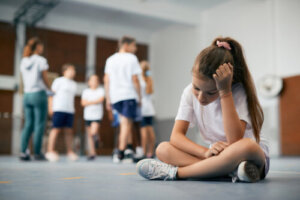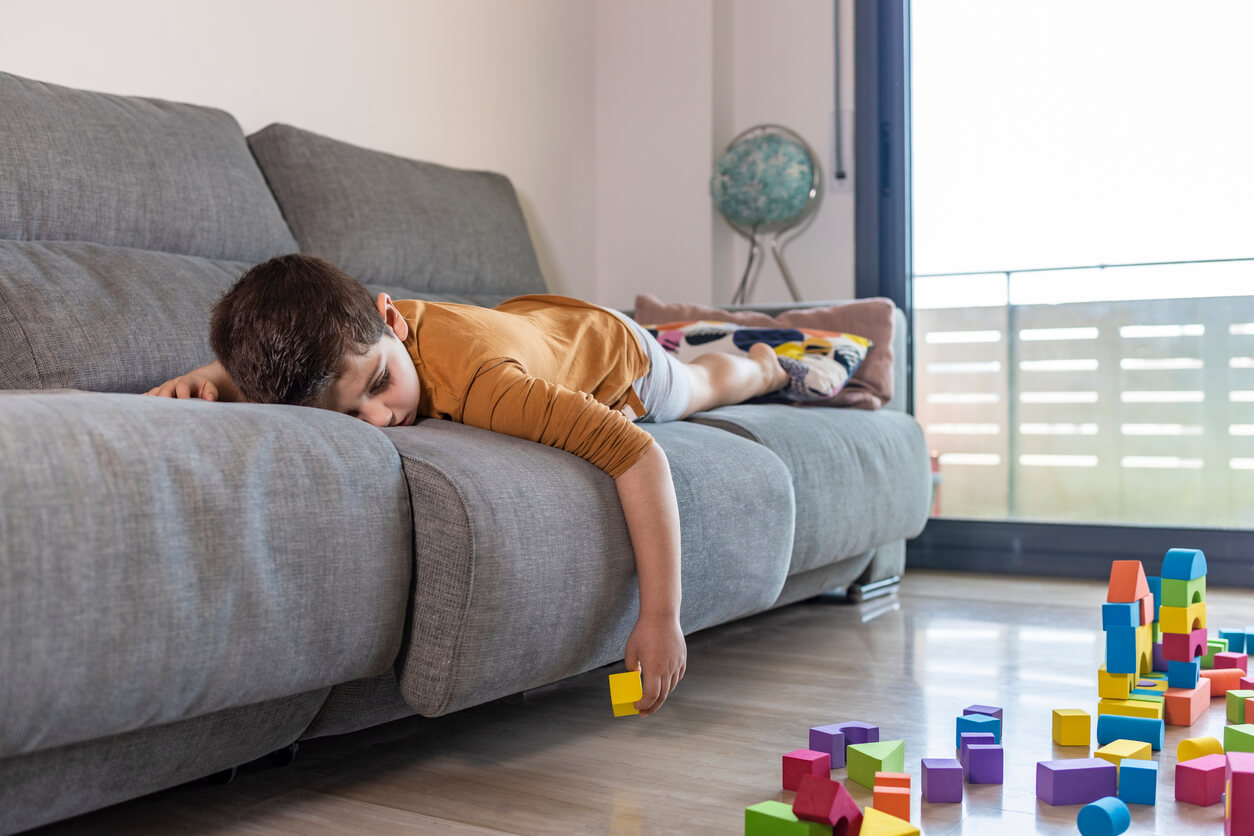The 6 Consequences of Lack of Free Time for Children


Written and verified by the psychologist Maria Fátima Seppi Vinuales
It may seem like an excellent idea for children to spend the whole day entertained, going from one activity to the next. However, the lack of free time in children has different consequences, such as mood swings, fatigue, or the little time they spend with their families. Today it seems that they have to run alongside adults and we forget that what should prevail is play. Children’s leisure time is a source of development and learning. Let’s take a look at the consequences of raising children with a full-time agenda.
Fear of children’s free time
We’re often afraid of boredom and children’s free time. Sometimes, we think based on the logic that the more stimulated they are, the better, as if it were a sin to miss out on developing their full potential.
We also do it from the attempt to organize the family dynamics. We have to work, and that’s why it’s better for children to be entertained. Other times, we also fill their agenda in order to have time available on our own. In fact, all these reasons can occur simultaneously.
However, it’s essential that we can be honest with ourselves and find ways to create time without the need to expose the children to physical and mental exhaustion. In addition, it’s equally important to know the benefits of free time for children and the consequences that arise when there’s a lack of free time.
You might be interested in: How Do Excess Extracurricular Activities Affect Your Children?

The 6 consequences of lack of free time in children
Some of the consequences of lack of free time in children are as follows:
1. No time for spontaneous exploration and boredom
Children that have a full-time schedule have little chance of getting bored and giving rise to the creativity that appears when they don’t know what to do. Of course, this hinders the development of imagination and improvisation.
2. Difficulties in self-knowledge are present
Many times, moving from one activity to the next ends up regulating and making the day-to-day routine. All plans are fulfilled as if in automatic mode, by inertia. This way, it often happens that children move in one direction, the one that tells them what to do, and move away from those other paths where they can explore and discover what they would like to do.
3. Changes in mood
Imagine how you feel when you have a day full of activity, from one place to another: Irritable, unfocused, with little ability to concentrate and do your best. The same thing happens to children. They too become exhausted and consequently overwhelmed. In the long run, these are situations that produce anxiety and stress.
4. Their capacity for self-management of time and autonomy is affected
When there’s little room to decide, children become accustomed to following a very fixed routine. Therefore, certain social skills also have little chance of being exercised and put to the test.

5. They miss out on the possibility of sharing family activities
Spending time at home and sharing family activities is important for children. Therefore, it’s key to find a balance, as the time we spend doing crafts, cooking with them, or carrying out any other plan is a way to strengthen bonds, be closer, and get to know them better.
6. Their social skills are affected
By playing and having free time, children also exercise personal and social skills, such as planning, decision-making, sharing, or agreeing, among others.
You may be interested in: How to Manage Children’s Boredom Without Resorting to Screens
When will children play?
Some years ago, Maná, a Mexican musical group, created a song in which they wondered where children will play, in the face of a world that was beginning to “dynamite” certain spaces, filling everything with cement and displacing open spaces and the outdoors.
Today, to the content of this song, we could add this concern: When will children play if today they have a more abundant and collapsed agenda than that of adults themselves? From school to sports, from sports to language, from language to instrument class, and so on.
In this hyper-demanding world, where it seems that opportunities only open up for those who have the most complete resumé, we transfer adult logic to the world of childhood. However, we overlook a fundamental issue: Children are in the midst of their development and play is the main way in which they do it. Kids have to have time to be kids.
It may seem like an excellent idea for children to spend the whole day entertained, going from one activity to the next. However, the lack of free time in children has different consequences, such as mood swings, fatigue, or the little time they spend with their families. Today it seems that they have to run alongside adults and we forget that what should prevail is play. Children’s leisure time is a source of development and learning. Let’s take a look at the consequences of raising children with a full-time agenda.
Fear of children’s free time
We’re often afraid of boredom and children’s free time. Sometimes, we think based on the logic that the more stimulated they are, the better, as if it were a sin to miss out on developing their full potential.
We also do it from the attempt to organize the family dynamics. We have to work, and that’s why it’s better for children to be entertained. Other times, we also fill their agenda in order to have time available on our own. In fact, all these reasons can occur simultaneously.
However, it’s essential that we can be honest with ourselves and find ways to create time without the need to expose the children to physical and mental exhaustion. In addition, it’s equally important to know the benefits of free time for children and the consequences that arise when there’s a lack of free time.
You might be interested in: How Do Excess Extracurricular Activities Affect Your Children?

The 6 consequences of lack of free time in children
Some of the consequences of lack of free time in children are as follows:
1. No time for spontaneous exploration and boredom
Children that have a full-time schedule have little chance of getting bored and giving rise to the creativity that appears when they don’t know what to do. Of course, this hinders the development of imagination and improvisation.
2. Difficulties in self-knowledge are present
Many times, moving from one activity to the next ends up regulating and making the day-to-day routine. All plans are fulfilled as if in automatic mode, by inertia. This way, it often happens that children move in one direction, the one that tells them what to do, and move away from those other paths where they can explore and discover what they would like to do.
3. Changes in mood
Imagine how you feel when you have a day full of activity, from one place to another: Irritable, unfocused, with little ability to concentrate and do your best. The same thing happens to children. They too become exhausted and consequently overwhelmed. In the long run, these are situations that produce anxiety and stress.
4. Their capacity for self-management of time and autonomy is affected
When there’s little room to decide, children become accustomed to following a very fixed routine. Therefore, certain social skills also have little chance of being exercised and put to the test.

5. They miss out on the possibility of sharing family activities
Spending time at home and sharing family activities is important for children. Therefore, it’s key to find a balance, as the time we spend doing crafts, cooking with them, or carrying out any other plan is a way to strengthen bonds, be closer, and get to know them better.
6. Their social skills are affected
By playing and having free time, children also exercise personal and social skills, such as planning, decision-making, sharing, or agreeing, among others.
You may be interested in: How to Manage Children’s Boredom Without Resorting to Screens
When will children play?
Some years ago, Maná, a Mexican musical group, created a song in which they wondered where children will play, in the face of a world that was beginning to “dynamite” certain spaces, filling everything with cement and displacing open spaces and the outdoors.
Today, to the content of this song, we could add this concern: When will children play if today they have a more abundant and collapsed agenda than that of adults themselves? From school to sports, from sports to language, from language to instrument class, and so on.
In this hyper-demanding world, where it seems that opportunities only open up for those who have the most complete resumé, we transfer adult logic to the world of childhood. However, we overlook a fundamental issue: Children are in the midst of their development and play is the main way in which they do it. Kids have to have time to be kids.
All cited sources were thoroughly reviewed by our team to ensure their quality, reliability, currency, and validity. The bibliography of this article was considered reliable and of academic or scientific accuracy.
- Betina Lacunza, Ana , & Contini de González, Norma (2011). Las habilidades sociales en niños y adolescentes. Su importancia en la prevención de trastornos psicopatológicos. Fundamentos en Humanidades, XII(23),159-182.[fecha de Consulta 6 de Septiembre de 2022]. ISSN: 1515-4467. Disponible en: https://www.redalyc.org/articulo.oa?id=18424417009
- Oyarzún Gómez, Denise, & Reyes Espejo, María Isabel. (2021). Bienestar y tiempo libre de niños y niñas a través de un mapeo fotográfico participativo. Revista de psicología (Santiago), 30(2), 71-85. https://dx.doi.org/10.5354/0719-0581.2021.65689
This text is provided for informational purposes only and does not replace consultation with a professional. If in doubt, consult your specialist.








